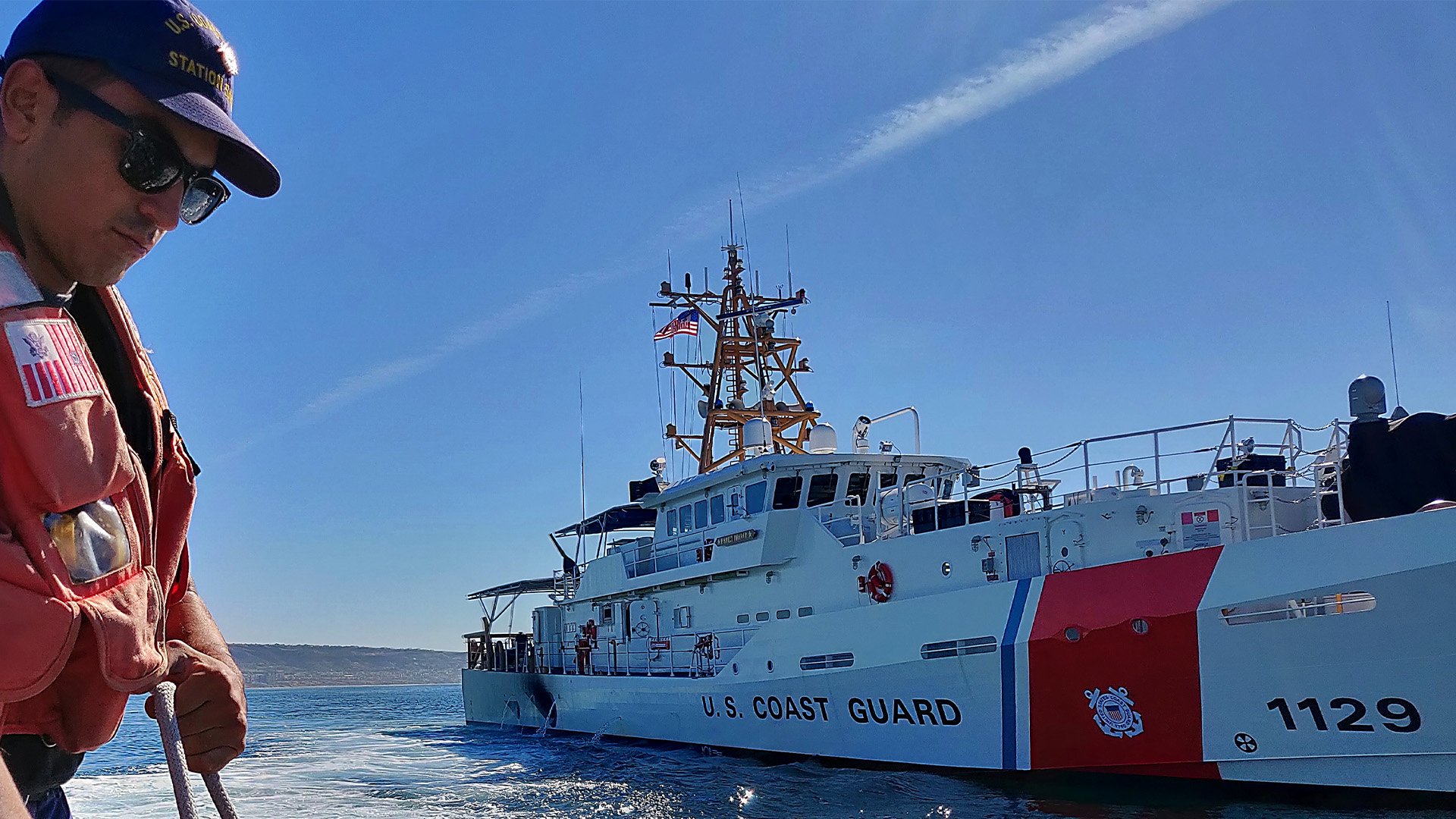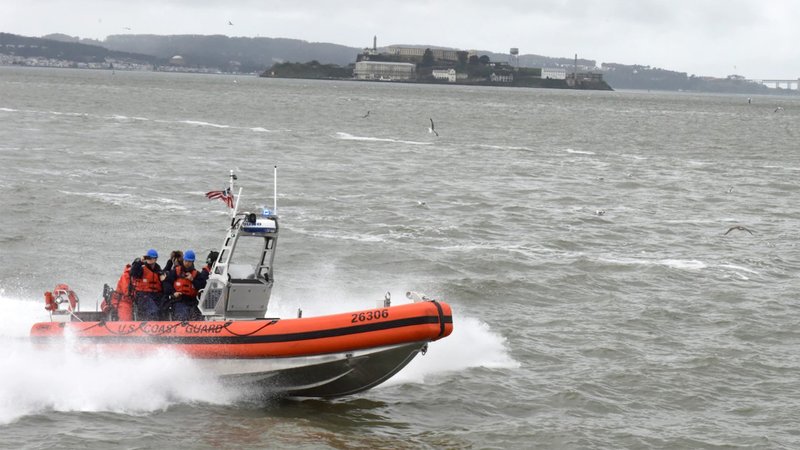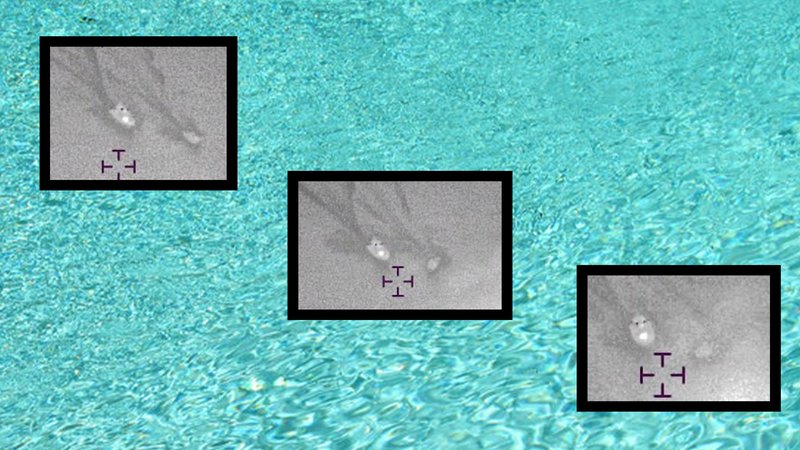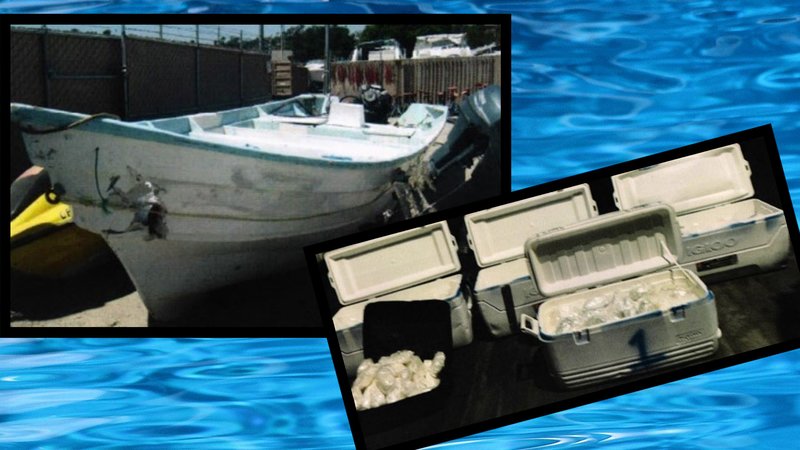
A US Coast Guard fireman ties off a fender on board a Coast Guard Station San Diego 45-foot Response Boat-Medium, with the cutter Forrest Rednour in the background, off the coast of California on Nov. 27, 2018. The crew of the Rednour made the ship's first drug bust during the patrol. US Coast Guard photo.
The Mexican skipper who speared his meth-stuffed fishing boat into his US Coast Guard pursuers during a dangerous 2020 drug run off California is going to stay in prison.
On Friday, Aug. 5, in San Diego, US District Judge Janis L. Sammartino called Miguel Ojeda Agundez’s conduct “egregious” as she sentenced him to 194 months in a federal penitentiary. Ojeda Agundez, 26, had faced up to a life sentence behind bars.
In a plea deal he inked with federal prosecutors on March 18, 2021, Ojeda Agundez confessed to committing 15 federal felonies, including conspiring to distribute methamphetamine, failure to heave to, and assault with a deadly weapon on five federal officers.
Ojeda Agundez became the last of his four-man crew to be convicted and sentenced for the botched drug-smuggling operation. His court-appointed attorneys did not respond to Coffee or Die Magazine's requests for comment.
“Unfortunately, this is not the first time the lives of our Coast Guard members have been threatened by drug smugglers,” Rear Adm. Andrew Sugimoto, the commander of US Coast Guard District 11, said in a prepared statement. “Senior Chief Petty Officer Terrell Horne III was killed during a countersmuggling operation. Those individuals responsible for taking his life and threatening the lives of other Coast Guard members were held accountable. As a service, we do not take these actions lightly and I trust the decision of the courts to continue to hold these criminals responsible for their continued disregard for life.”

Kade Horne holds a program and listens to the benediction during a ceremony to celebrate the life of his father, Coast Guard Senior Chief Petty Officer Terrell E. Horne III, at Second Presbyterian Church in Charleston, South Carolina, on Jan. 5, 2013. The Executive Petty Officer and Boarding Officer of the cutter Halibut,Horne was conducting maritime law enforcement operations near California's Santa Cruz Island on Dec. 2, 2012, when a drug smuggler operating a panga boat rammed it the senior chief's small vessel, killing him. The panga's operator was convicted of murder. US Coast Guard photo.
A fisherman by trade who was out of work after Mexican authorities curtailed catches in the Gulf of California to protect the endangered Vaquita porpoise, Ojeda Agundez began concocting a plot in 2020 to bring methamphetamine to a Los Angeles parking lot by sea for $60,000.
Once in California, the crew planned to abandon their fishing boat and sneak back into Mexico by land.
By his own admission, Ojeda Agundez had become strung out on crystal meth, which he mixed with the anti-anxiety drug Clonazepam during his 16-hour days on board a fishing boat. Before he and his crew shoved off on his meth-smuggling caper, he’d also been drinking booze and had barely slept for nearly four days.
Ojeda Agundez and the other three men left Mexico on Aug. 7, 2020, in a panga, a small but fast and nimble fishing craft, which they hoped to run in the darkness without lights to evade US Department of Homeland Security patrols.
That didn’t work.

The US Coast Guard's 26-foot over-the-horizon cutter boat is an aluminum deep-v, single diesel engine, water jet propelled planing monohull that can reach 30 knots when pursuing drug smugglers at sea. US Coast Guard photo.
A few minutes before midnight, federal agents above them in a US Customs and Border Patrol plane spotted the boat crossing into US waters, about 24 nautical miles west of Mexico. Officials scrambled the US Coast Guard cutter Forrest Rednour to intercept the panga off San Clemente.
Shortly after 1 a.m. on Aug. 8, 2020, the US Coast Guard crew launched an over-the-horizon cutter boat. The five US Coast Guard personnel on board it quickly caught up to the panga and ordered Ojeda Agundez to stop the engine and surrender.
When he didn’t respond, a member of the Coast Guard crew fired a warning shot across the bow. Then Ojeda Agundez turned his panga 90 degrees and gunned his engine. Seeing the panga flying at the cutter boat, a Coast Guard crew member fired a second shot, but it didn’t stop Ojeda Agundez.
The panga rammed the cutter boat, sending the vessel spinning across the waves like a broken top. The force of impact bent the cutter boat’s beam and injured at least one of the crew members.
Ojeda Agundez sped off into the night, the battered cutter boat limping after him.

Surveillance footage from a US Customs and Border Patrol aircraft shows a panga boat operated by a Mexican skipper, Miguel Ojeda Agundez, turning to ram an interceptor vessel on Aug. 8, 2022, roughly 11 nautical miles west of San Clemente, California. Coffee or Die Magazine composite.
By 1:30 a.m., a faster US Customs and Border Patrol Air and Marine interceptor vessel had taken over the pursuit and closed on the panga.
The agents on board the interceptor again ordered Ojeda Agundez to surrender and fired a warning shot, but he turned his panga into the boat twice, repeatedly flipping off the federal agents with his middle finger.
The agents fired volleys of rounds to disable the panga’s engine before the boat came around again. A disabling round finally ripped through the motor, and the panga began to drift, dead in the water, roughly 11 nautical miles west of San Clemente.
On board the tiny panga, they found two of Ojeda Agundez’s crew injured from the collisions.
They also turned up four large ice chests and a black suitcase filled with 227 kilograms of meth, worth more than $1 million on the street.

Captured by US authorities on Aug. 8, 2022, off the coast of California, this Mexican panga fishing boat was carrying 227 kilograms of methamphetamine, worth more than $1 million on the street. Coffee or Die Magazine composite.
In the six months after Ojeda Agundez signed his plea deal, prosecutors sparred with his defense attorneys over how long the Mexican man would stay in prison.
Prosecutors argued that Ojeda Agundez committed a series of very serious and potentially deadly crimes. Calling him a “grave danger to the community” whose actions left the Coast Guard team with long-lasting physical and mental anguish, prosecutors called for the Mexican man to spend 27 years behind bars.
But Ojeda Agundez’s attorneys asked for leniency for the married father. They told the judge that Ojeda Agundez had been a model federal inmate who was committed to receiving substance abuse treatment.
They asked for 15 years in a penitentiary. The judge gave him a little more than 16.
“This case is a reminder of the heroism, bravery, and professionalism that Coast Guard officials employ on every mission to safeguard the United States from drug smugglers,” US Attorney Randy Grossman said in a prepared statement. “Violence against the Coast Guard will not be tolerated and will be aggressively prosecuted by this office.”
Read Next: Twilight for Arlington National Cemetery’s Gray Horses?

Carl Prine is a former senior editor at Coffee or Die Magazine. He has worked at Navy Times, The San Diego Union-Tribune, and Pittsburgh Tribune-Review. He served in the Marine Corps and the Pennsylvania Army National Guard. His awards include the Joseph Galloway Award for Distinguished Reporting on the military, a first prize from Investigative Reporters & Editors, and the Combat Infantryman Badge.
BRCC and Bad Moon Print Press team up for an exclusive, limited-edition T-shirt design!
BRCC partners with Team Room Design for an exclusive T-shirt release!
Thirty Seconds Out has partnered with BRCC for an exclusive shirt design invoking the God of Winter.
Lucas O'Hara of Grizzly Forge has teamed up with BRCC for a badass, exclusive Shirt Club T-shirt design featuring his most popular knife and tiomahawk.
Coffee or Die sits down with one of the graphic designers behind Black Rifle Coffee's signature look and vibe.
Biden will award the Medal of Honor to a Vietnam War Army helicopter pilot who risked his life to save a reconnaissance team from almost certain death.
Ever wonder how much Jack Mandaville would f*ck sh*t up if he went back in time? The American Revolution didn't even see him coming.
A nearly 200-year-old West Point time capsule that at first appeared to yield little more than dust contains hidden treasure, the US Military Academy said.












